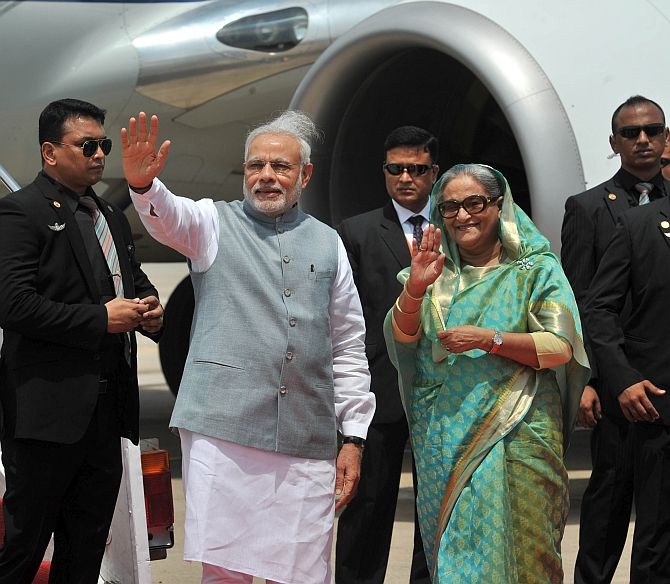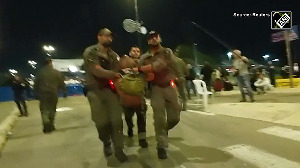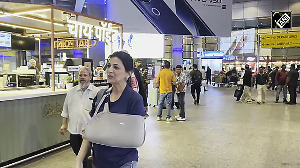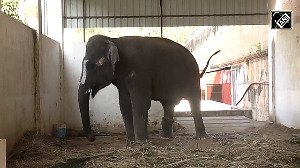'When we have a terrorist outfit in a neighbouring nation, we need to do whatever we can to neutralise that threat,' says Ramananda Sengupta.

We should have seen it coming.
Daesh, or Islamic State had made it very clear in the April 2016 issue of Dabiq, their slickly produced online magazine, that Bangladesh was its next big terror base -- in order to attack India.
Announcing Abu Ibrahim Al-Hanif's appointment as the 'Amir Of The Khilafah's (Caliphate's) Soldiers In Bengal (Bangladesh),' with a lengthy interview, IS was clearly semaphoring its intent.
And for those who still didn't get it, here's what Al-Hanif had to say in that interview: 'Bengal is an important region for the Khilafah and the global jihad due to its strategic geographic position. Bengal is located on the eastern side of India, whereas Wilayat Khurasan (The Af-Pak region) is located on its western side. Thus, having a strong jihad base in Bengal will facilitate performing guerrilla attacks inside India simultaneously from both sides and facilitate creating a condition of tawahhush (savagery aimed at creating fear and chaos) in India along with the help of the existing local mujahidin there.'
Pledging to kill all 'non-believers,' he says: 'It is not the methodology of the Khilafah's soldiers to send more threats to the enemies of Allah. Rather, we let our actions do the talking. And our soldiers are presently sharpening their knives to slaughter the atheists, the mockers of the Prophet, and every other apostate in the region, biidnillah (by Allah's will).'
He also sneered at local Islamic outfits, describing them as apostates while gleefully admitting that several of their followers had turned to Daesh.
But to do that, these lower rung psychos need to prove their loyalty, capability and intent.
Which led to a continuing spate of barbaric and random attacks across Bangladesh on Hindus, Buddhists, other minorities and 'apostates.'
Unlike the continuing 'political' violence in the country, these attacks were far more barbaric, with attempts at public beheadings while chanting 'Allah-hu Akbar.'
Sheikh Hasina Wajed's government was in denial. Insisting that these were local goons sponsored by the Opposition -- and some 'foreign forces' --to harass her government, she used it as an excuse to further hound her opponents and local religious outfits like the Jama'atul Mujahideen Bangladesh, Harkat-ul-Jihad-al Islami Bangladesh, the Jagrata Muslim Janata Bangladesh and other assorted groups.
Thereby, sending even more of their cadres into the waiting arms of bloodthirsty Daesh.
It is important to remember that Prime Minister Hasina, described as an Indian stooge by her rivals, won her second consecutive term in 2014 in an election boycotted by all major Opposition parties. Her Awami League thus won 154 of the total 300 parliament seats uncontested.
The main Opposition Bangladesh Nationalist Party, led by Khaleda Zia, had allied with fundamentalist outfits like the Jamaat-e-Islami Bangladesh, the largest Islamic party in the country.
Facing yet term out of power, the BNP and its allies have been bristling with righteous indignation, and doing everything they can to disrupt government and force a mid-term election.
This resentment has spread to the local populace due to Hasina's increasingly autocratic ways and her government's brutal and blanket crackdown on anyone perceived as critical of her regime, including journalists and ordinary citizens.
The execution of several Jaamat leaders for 'war crimes' committed during the Liberation War of 1971 has not helped either. The Jamaat, which opposed liberation from Pakistan, had sided with the Pakistan army to launch one of the most brutal genocides in recent history, massacring thousands of pro-independence 'intellectuals' in then East Pakistan in 1971.
These leaders, indicted and sentenced by a war crimes tribunal, were executed after their appeals were rejected by the higher courts. Yet many see this as a political move rather than a genuine attempt to deliver justice.
So what can India, which has been clearly and publicly threatened by Al-Hanif, do except wait for a Daesh attack on Indian soil?
I know that what I am about to suggest will be perceived as interference in the affairs of another sovereign nation, something New Delhi sanctimoniously preaches against.
The fact that relations between New Delhi and Dhaka have never been better -- the resolution of the enclaves issue and Dhaka's recent permission to allow transhipment of goods to India's northeast through Bangladesh are just two examples -- actually makes things even more difficult.
But when we have a terrorist outfit sitting in a neighbouring nation, which clearly fufils the definition of a threat -- capability and intent -- we need to do whatever we can to neutralise that threat.
(Yes, we face the same problem on our western border, with the difference that it is the government/military there which backs terror as an instrument of policy.)
So, here's a list things of five things we could do, in random order, to check or delay Daesh's plans to promote tawahhush in India from Bangladesh.
One, strengthen our intelligence capabilities in the country. In 2011, inputs from Indian intelligence led to the squelching of a possible military coup against Hasina and the arrest of several senior and mid-rung military and other officers.
It is critical to ramp up our intelligence sources and capabilities in Bangladesh if we are to pre-empt an attack by Daesh. The focus should be on identifying the Daesh leadership in Bangladesh and take them out.
Two, convince Hasina to reach out to her opponents instead of trampling all over them. Announcing a referendum over the need for an interim government before each election could be a good first step.
It was her decision to do away with this system (among other things) which led to the Opposition boycott of the last election.
Three, reach out to Khaleda Zia and urge her to convince her followers to renounce violence and work towards nation building. We could offer her help for any such initiative, thereby sending out a message that we are willing to work with anyone with democratic credentials.
Four, tell Dhaka that it is time to get out of denial mode, and that any attack on India from Bangladeshi soil would be seen as a breach of friendship, regardless of whether it was government backed or not.
Ramping up measures to stem immigration from Bangladesh should also be a priority.
Five, identify and align with all democratic and secular forces in Bangladesh, and offer them financial and moral support. (Yes, that is what Pakistan apparently offers Kashmiri separatists, except the aim there is the dismemberment of India, whereas our aim is to help Bangladesh from being torn apart by fundamentalists.)
Yet even if we implement all this, I still predict a Daesh attack on India soon, probably in West Bengal or in Assam.
Forewarned, they say, is fore-armed. Let no one say we didn't see it coming.
Ramananda Sengupta is a senior commentator on foreign affairs. Then a member of Rediff.com's editorial team, he traveled to Dhaka in 2005 and was among the first reporters to warn about the Islamist threat in Bangladesh.
You can read his reports here.
IMAGE: Prime Minister Narendra Modi and Bangladesh Prime Minister Sheikh Hasina Wajed in Dhaka, June 6, 2015.











 © 2025
© 2025